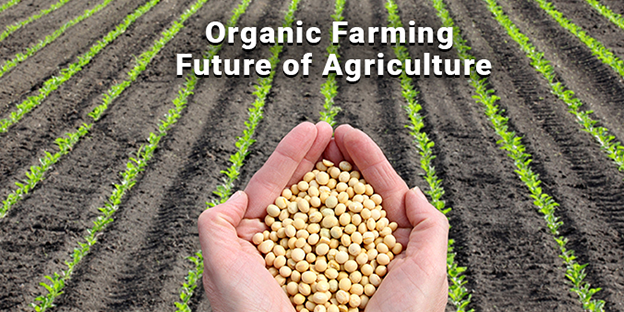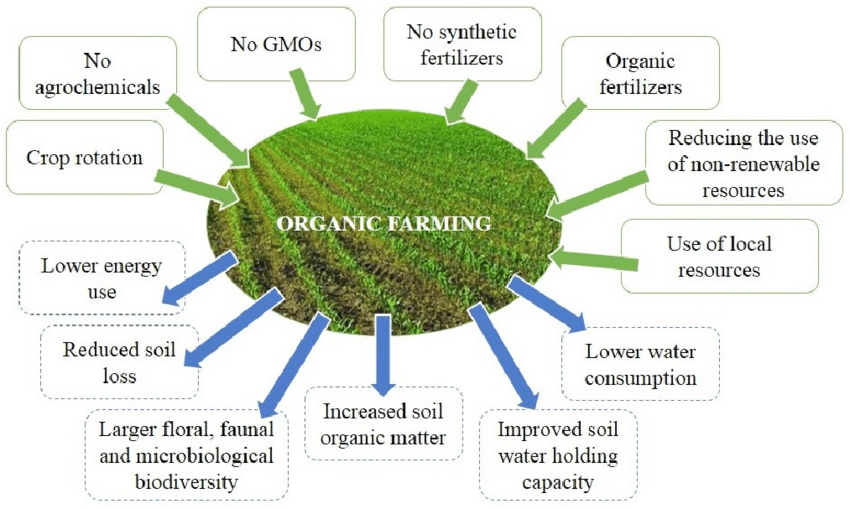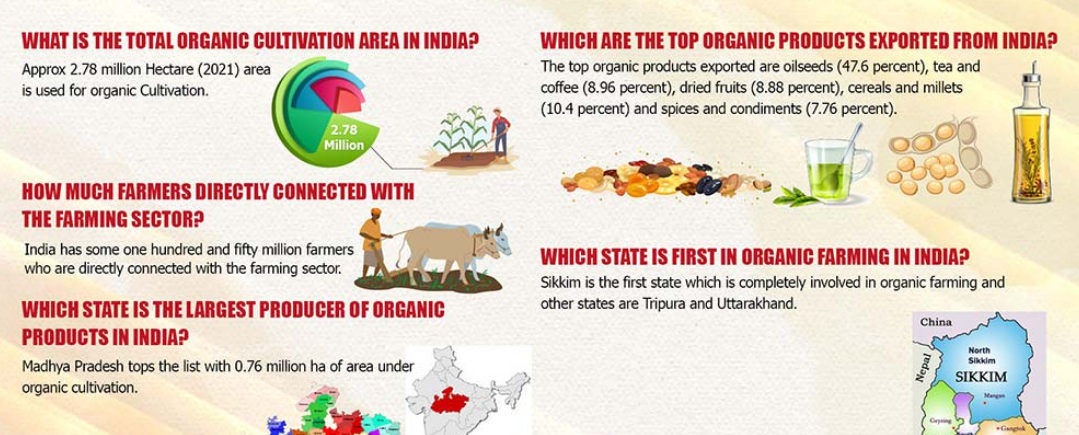Description

Disclaimer: Copyright infringement not intended.
Context
- Vice President, Shri M. Venkaiah Naidu underlined the importance of organic farming for sustainable and stable development.
Background
- In a world with the emergence of numerous diseases, food safety is a major concern as well as a necessity.
- Extensive usage of chemical fertilizers and pesticides stands as an impediment towards the maintenance of a proper health profileof the population.
- Therefore, the practice of organic farming opens up a sustainable doorway to prevent various health hazards originating from the agro-based products that we consume.
- This would bring down the usage of pesticides and chemical fertilizers in agriculture.
- The road to transform the agricultural practices in India to absolutely an organic one, is accompanied by challenges that require expert intervention and a proper discussion.
About Organic Farming
- The FAOdefines organic farming as a unique production management system that promotes and enhances agro-ecosystem health, biodiversity, biological cycles and soil biological activity.
- According to FSSAI, ’organic farming’ is a system of farm design and management to create an ecosystem of agriculture production without the use of synthetic external inputs such as chemical fertilisers, pesticides and synthetic hormones or genetically modified organisms.
- Organic farm produce means the produce obtained from organic agriculture, while organic food means food products that have been produced in accordance with specified standards for organic production.
Principles of Organic Farming in India
- Organic agriculture grows and develops with these principles. These can contribute to improving organic agriculture for the world.
There are four principles of organic farming are as follow:-
- Principles of Health – The health of the ecosystem, people, and communities.
- The Principles of Ecology – The right balance between ecosystem and environment or nature.
- Principles of Fairness – Good human relationships and quality of life.
- Principles of Care – The considerations about the environment and environment of the future.

Organic Farming in India
- India ranked 1st in terms of the number of organic farmers and 5th in terms of certified organic area.
- India ranks 8th in the world’s total organic agricultural land.
- There has been a 51% increase in the production of organic products in 2020-21.
- So far, Sikkim is the only state to be considered fully organic. Besides, the states of Maharashtra, Rajasthan, Himachal Pradesh, Karnataka and the union territory of Jammu & Kashmir are ahead in the promotion and adoption of organic farming.
- North East India has traditionally been organicand the consumption of chemicals is far less than the rest of the country.
- Similarly the tribal and island territories have been traditionally practicing organic farming.
- The major organic exports from India have been flax seeds, sesame, soybean, tea, medicinal plants, rice and pulses.
- There was an increase of nearly 50% in organic exports in 2018-19, touching Rs. 5151 crore.
- Commencement of exports from Assam, Mizoram, Manipur and Nagaland to UK, USA, Eswatini and Italyhave proved the potential by increasing volumes and expanding to new destinations as the demand for health foods increases.

Important Government Initiatives
- Paramparagat Krishi Vikas Yojana:promotes cluster based organic farming with PGS (Participatory Guarantee System) certification. Cluster formation, training, certification and marketing are supported under the scheme.
- Rashtriya Krishi Vikas Yojana: Assistance for promotion of organic farming on different components are also available with the approval of State Level Sanctioning Committee
- One District - One Product:The programme aims to encourage more visibility and sale of indigenous and specialized products/crafts of Uttar Pradesh, generating employment at the district level.
- National Mission on Oilseeds and Oil Palm:Financial assistance is being provided for different components including bio-fertilizers, supply of Rhizobium culture/Phosphate Solubilising Bacteria (PSB)/Zinc Solubilising Bacteria (ZSB)/ Azatobacter/Mycorrhiza and vermin-compost.
- The Organic Farming Action Programme: The objective is to promote and significantly develop organic farming by means of priority measures
- Food Safety and Standards Authority of India(FSSAI) is the food regulator in the country and is also responsible for regulating organic food in the domestic market and imports.
- Participatory Guarantee System (PGS):PGS is a process of certifying organic products, which ensures that their production takes place in accordance with laid-down quality standards. PGS Green is given to chemical free produce under transition to ‘organic’ which takes 3 years. It is mainly for domestic purpose.
- National Program for Organic Production (NPOP):NPOP grants organic farming certification through a process of third party certification for export purposes.
- Agri-export Policy 2018:Focus on clusters and Marketing and promotion of “Produce of India” have positively impacted the organic farming in India
- Zero Budget Natural Farming:is a method of chemical-free agriculture drawing from traditional Indian practices.
Challenges in Organic Farming
- Shortage of Biomass:experts are not sure whether all the nutrients with the required quantities can be made available by the organic materials. Even if this problem can be surmounted, they are of the view that the available organic matter is not simply enough to meet the requirements
- Disparity of Supply and Demand:Non-perishable grains can be grown anywhere and transported to any location but this is not the case with fruits and vegetables.
- Time:organic farming requires greater interaction between a farmer and his crop for observation, timely intervention and weed control for instance.
- High MRP:It is almost obvious that due to the extreme care taken to go along with organic farming, the results would be kept at a high price.
- Lack of special infrastructure:Most large organic farms still operate in an industrialized agriculture style, including industrial transportation of the food from field to plate. Unfortunately, this involves the adoption of the same environmentally harmful practices as those of factory farms which are however hidden under the cover of being organic
- Marketing of organic produce is also not properly streamlined. There are a number of farms in India which have either never been chemically managed / cultivated or have converted back to organic farming because of farmers’ beliefs or purely for reason of economics.
Benefits of organic farming:
- Better Taste and More Nutrition: This is due to the fact that they are given a much longer time to develop and are not pumped with artificial things.
- Reduces pesticide and chemical residue in soil: ensures the health of soil, water, air and flora and fauna.
- Promotion of Biodiversity: Crop rotation to build soil fertility and raising animals naturally helps promote biodiversity, which promotes greater health across all living species. As organic farms provide safe havens to wildlife, local ecosystems also improve.
- Consumes Less Energy: This is because manufacturing synthetic fertilizers consumes a significant amount of energy.
- Long-term sustainability: Organic farming takes a proactive, preventative approach instead of dealing with problems after they emerge which can be too late.
- Reduced erosion and better water management
- Familiarity with the techniques:Organic farming is like going back to the roots before mechanization hit the lands. Thus the farmers can easily understand and adapt to the techniques of organic farming that deploys traditional knowledge.
Way Forward- the avenues for future development
- Experts construe that the upgrading of technology and empowering research in agriculturewill provide an impetus to the development of organic farming.
- This would assure income generationresulting in the reduced dependence on external products.
- Therefore, the experts recommend integrating the natural way in the farming system as nature stands out as the best model to be scaled and replicated by active collaboration with the international community and proper government interventions.
- This would be an enabler in connecting organic farmers with the global supply chain.
- The experts envisaged a roadmap to exploit the entire domestic market of organic products in a holistic manner.
- With greater awareness and capacity building of the producers in compliance with international standards,Indian organic farmers will soon be reinforcing their rightful place in global Agri-trade.
- India needs the introduction of structural changes through policy interventionsand technological deployment in organic farming and make it resilient, sustainable and profitable.
- Agricultural universities need to focus more on organic and natural farming and promote innovation and agri-entrepreneurship among the youth.
Agriculture is not just farmers’ concern, rather all of us are equal stakeholders in its development as food is a basic necessity for everyone.
Read: https://www.iasgyan.in/daily-current-affairs/community-managed-natural-farming-apcnf
https://www.pib.gov.in/PressReleasePage.aspx?PRID=1822088














